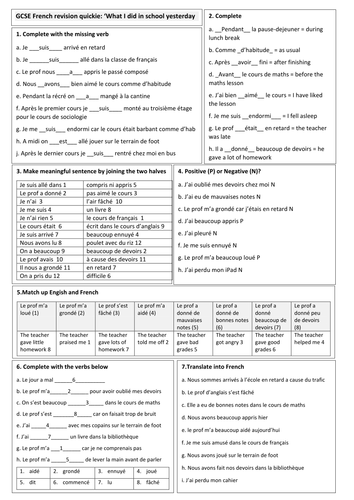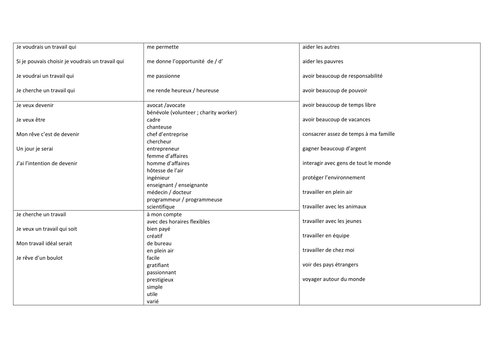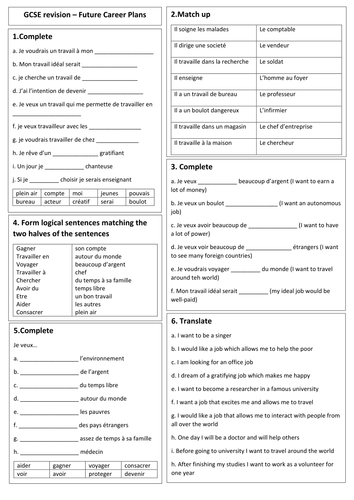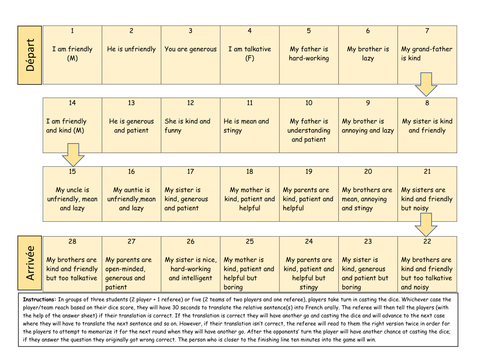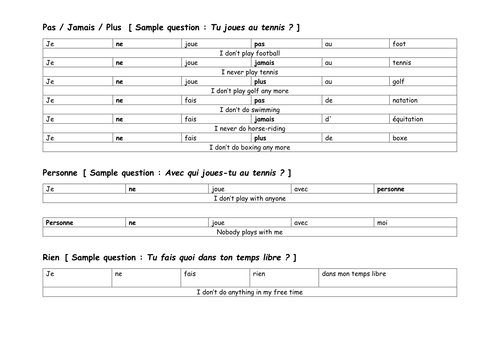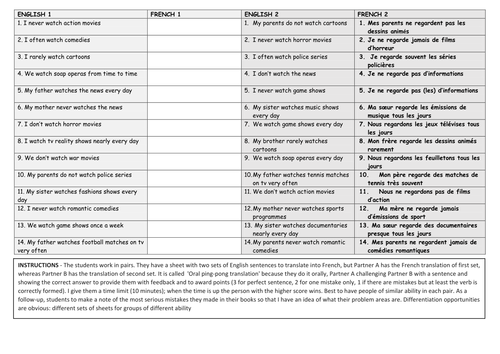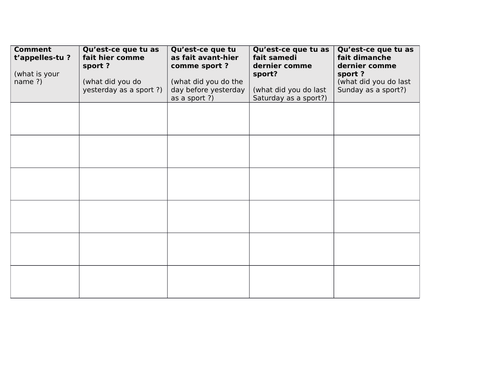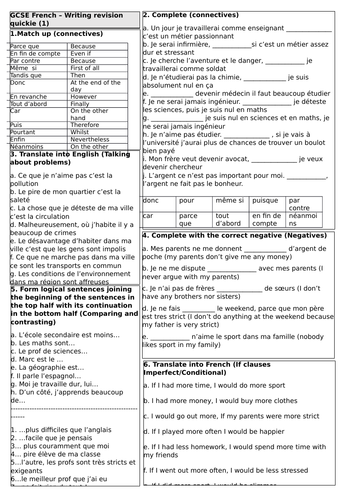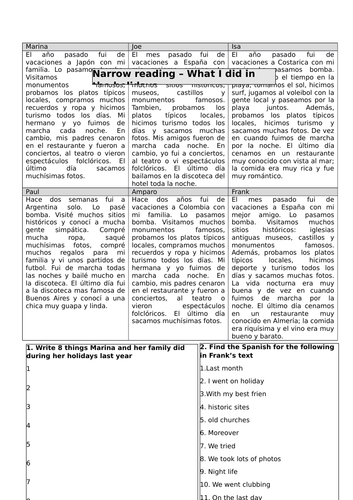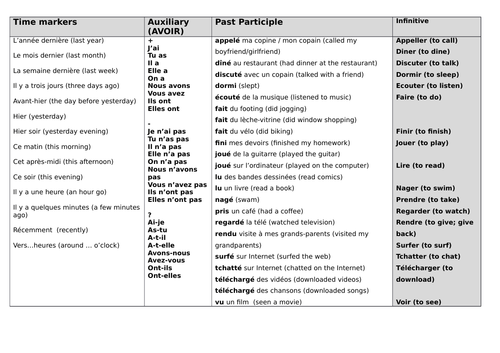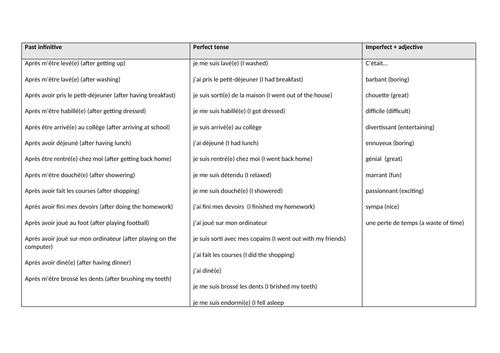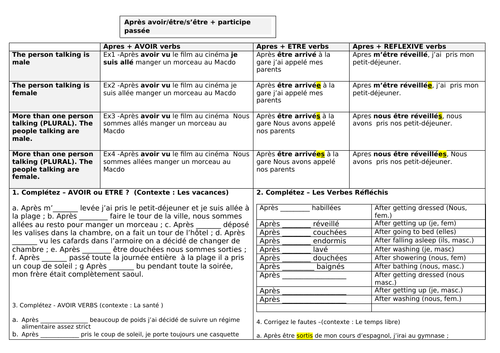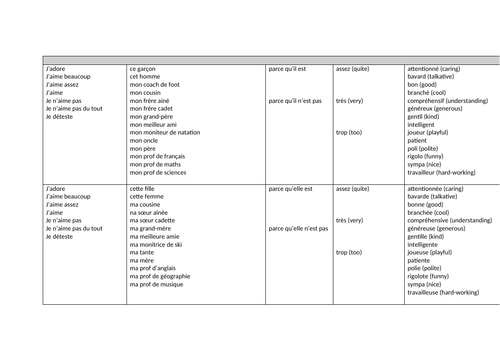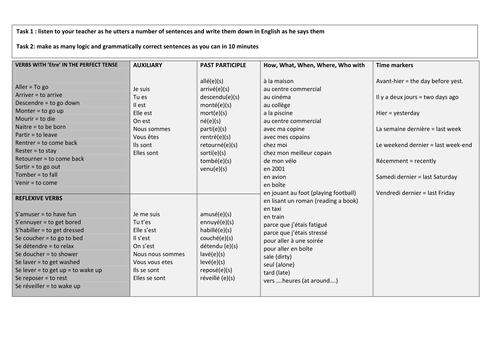
389Uploads
3155k+Views
5758k+Downloads
World Languages

GCSE French quickie (Feb 2017) - What I did yesterday at school (with Answer Key)
A quickie embeddin practice in Perfect Tense in the topic of school life

GCSEFrench revision quickie (HIGHER) - Connective and adverbs (WITH SOLUTION)
Covers main connectives and some adverbs of place and time

KS3 French - Sentence builder on schoolday + vocabulary consolidation + translation
A sentence builder on activities and times
A translation based on the sentence builder

GCSE French revision - Pool of resources on future plans
Includes:
- bilingual translation task
- revision quickies based on sentence builder with SOLUTION
- a very comprehensive sentence builder

GCSE revision quickie with SOLUTION (March 2017) - World of Work (4)
quickie with answer key on world of work

Year 7 / 8 French - Oral ping-pong translation game (pair-work)
INSTRUCTIONS - The students work in pairs. They have a sheet with the same English sentences to translate into French, but Partner A has the translation of sentences 1 to10, whereas Partner B has the translation of sentences 11 to 20.
I call it 'Oral ping-pong translation' because they do it orally, Partner A challenging Partner B with a sentence and showing the correct answer to provide them with feedback and to award points (3 for perfect sentence, 2 for one mistake only, 1 if there are mistakes but at least the verb is correctly formed). I give them a time limit (10 minutes); when the time is up the person with the higher score wins. Best to have people of similar ability in each pair. Here is an example: I made for a very able year 11 of mine. Obviously the activity can be done in writing too.
As a follow-up, I get the students to make a note of the most serious mistakes they made in their books so that I have an idea of what their problem areas are. Differentiation opportunities are obvious: different sets of sheets for groups of different ability

KS3/4 French - Oral or Written translation board game on character description with answer key
Instructions: In groups of three students (2 player + 1 referee) or five (2 teams of two players and one referee), players take turn in casting the dice. Whichever case the player/team reach based on their dice score, they will have 30 seconds to translate the relative sentence(s) into French orally. The referee will then tell the players (with the help of the answer sheet) if their translation is correct. If the translation is correct they will have another go and casting the dice and will advance to the next case where they will have to translate the next sentence and so on. However, if their translation isn’t correct, the referee will read to them the right version twice in order for the players to attempt to memorize it for the next round when they will have another go. After the opponents’ turn the player will have another chance at casting the dice; if they answer the question they originally got wrong correct. The person who is closer to the finishing line ten minutes into the game will win.
I do a round in writing (students write on miniwhiteboards or iPads) then one or two orally changing partners each time. Students love it but adequate prep essential.

KS2/3 French - Oral translation board game on French basics (personal info)
Instructions: In groups of three students (2 player + 1 referee) or five (2 teams of two players and one referee), players take turn in casting the dice. Whichever case the player/team reach based on their dice score, they will have 30 seconds to translate the relative sentence(s) into French orally. The referee will then tell the players (with the help of the answer sheet) if their translation is correct. If the translation is correct they will have another go and casting the dice and will advance to the next case where they will have to translate the next sentence and so on. However, if their translation isn’t correct, the referee will read to them the right version twice in order for the players to attempt to memorize it for the next round when they will have another go. After the opponents’ turn the player will have another chance at casting the dice; if they answer the question they originally got wrong correct. The person who is closer to the finishing line ten minutes into the game will win.
I do a round of written transl and one of oral changing partners

Year 7/8 French - Scaffold for ILRs (Implicit Learning Routines)
Scaffolding sheets to use in support of the following daily ILRs
- Register routine to elicit use of expressions indicating emotional states or feelings
- Small talk about what one did yesterday, last weekend, etc.
- Exit ticket routine at end of lesson : what are you going to do this eve, tomorrow, weekend, etc.
- Grumpy time routine (teacher ask questions and students must answer always in the negative usin different negative structures each time)

KS3/4 French - Oral scaffold for conversation on TV, narrow reading and oral ping pong translation
1. Talking mats (10 questions about tv habits) + narrow reading including three tenses
2. Oral ping pong translation

KS3 French - Talking about hobbies in the past
Sentence builder
Consolidation
Reading comprehension
Survey

KS3 Spanish - Pool of resources on talking about a past holiday
Includes:
A sentence builder
Two pages of narrow reading tasks
One page of narrow reading tasks + translation recycling same vocab
A vocab builder
A survey

KS3/4 French - Perfect tense of verbs in the context of leisure (all persons)
Resources include:
A sentence builder
A set of narrow readings
A vocab builder to reinforce the language in the above

KS3/4 French - Après + past infinitive (pool of resources)
A sentence builder and other resources to practise the use of Après + past infinitive

KS3 French - Pool of resources on present of -ER verbs
A sentence builder, a translation board game and some consolidation drills on -ER verbs + hobbies

KS3/4 French writing - Modelling the use of Après + past infinitive
A sentence builder + a set of consolidation activities

KS3 French - Talking about people (positive and negative traits)
Sentence builders and some consolidation work as follow-up

KS3 French - Talking in the perfect tense ETRE and REFLEXIVE verbs (sentence builder and model text)
A sentence builder to present verbs that form the perfect tense with ETRE , including reflexive verbs

